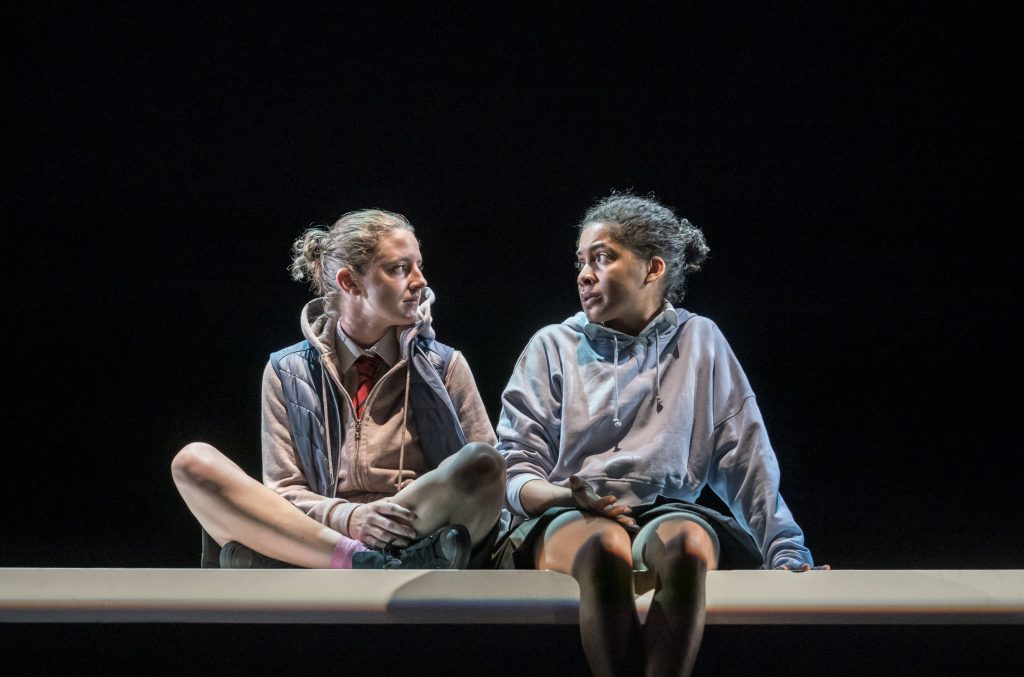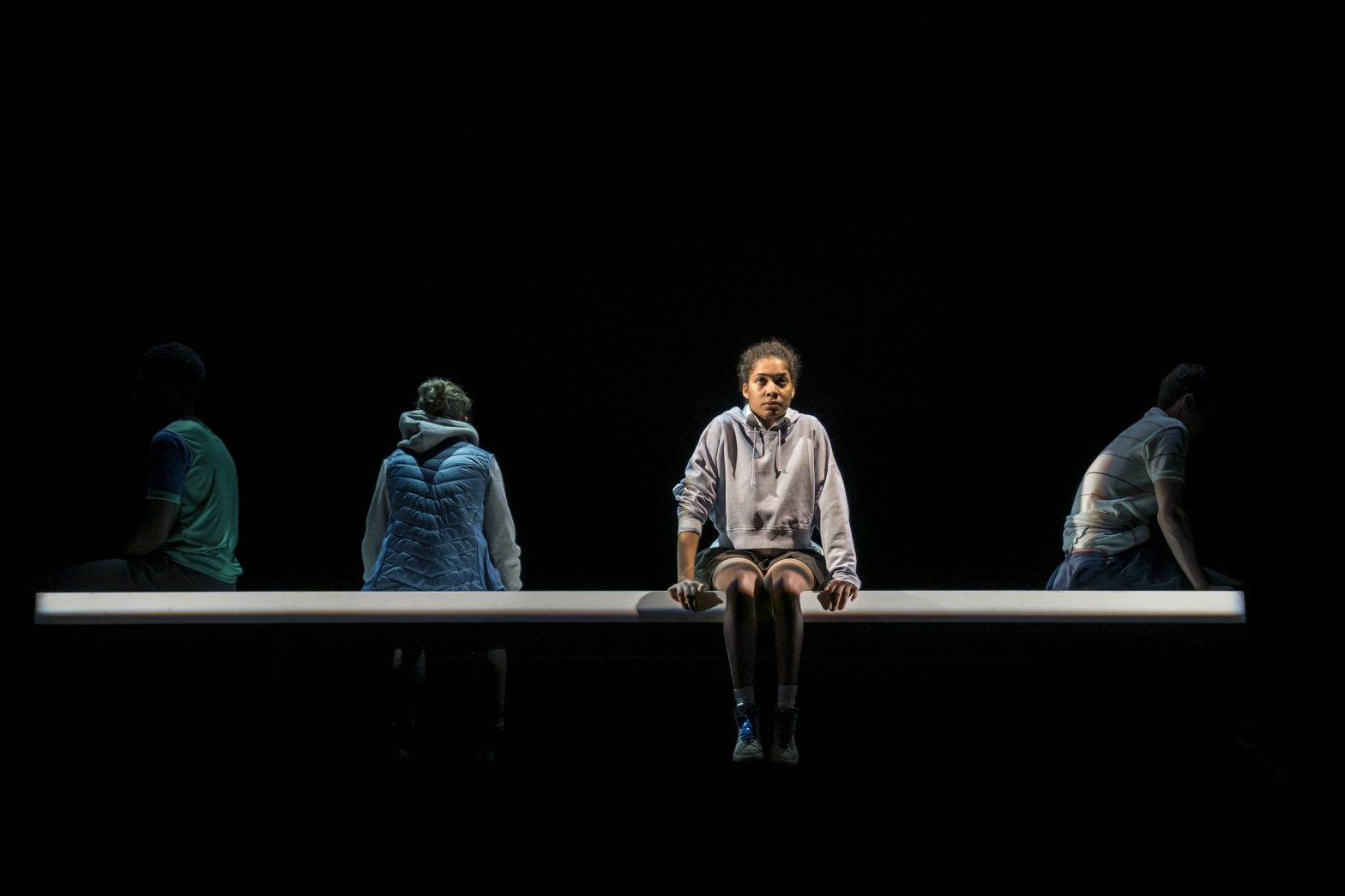Nkenna Akunna: Ma’am, you’re busy!
Rebekah Murrell: I’m alright, you know! Yeah. I’m good. This job is just… crazy. I’ve never done anything like it.
NA: What does it feel like to move from the relative naturalism of plays like Nine Night and Whitewash, to the very singular and abstract work of Caryl Churchill?
RM: I’m playing a girl who is made out of glass and in one of the scenes we’re sat on a mantle piece – the focal point of the set design. We’re essentially floating in mid air on a shelf… in the Royal Court (laughs). Visually, it’s incredible. It literally feels like terror. It’s getting better, to be fair. I came into this process with vertigo and I’m gonna leave without it.

NA: Amen.
RM: There are truths that are fundamental and absolute about the world in a naturalistic play, and quite a lot of them are loaded in the text. Whereas with this work it feels like you could be anywhere and it could be it could be anything depending on your reading of the scene. It feels almost like alternate realities – like you can exist in multiple realities and you’re choosing which one feels the most fitting. You are free to interrogate the word – nothing is thrown away, nothing is whimsical.
In terms of the staging, in Nine Night we were in what literally felt like my grandma’s house. I would forget I was on stage half of the time. With this, you’re edging past each other on this floating shelf in the sky and you can’t really see each other. Also, as much as I love to commit to a role, I’m not actually made out of glass, spoiler alert, so when other people have to look through me, there’s a lot of technical work that goes with that. It’s definitely a different style of acting. It’s been so much learning about nuance and craft and bravery of gesture and creativity and imagination.
NA: Say more about bravery of gesture?
RM: Caryl Churchill… damn. I’m in the first of the four plays, so I hadn’t read or heard the other scripts until rehearsals. When we read them all together it was bonkers, but in the most incredible way. It’s taught me a lot about trusting the text. Caryl Churchill and James Macdonald are really good creative collaborators and, possibly more importantly, friends, and you can really feel that in the work and in the room. They trust each other. My perhaps youthful or unwise instinct when I see something like the efficient and quite sparse text that Caryl writes is to fill it and overload it. In my cast, we’re four young actors and at the beginning of the process we were trying to throw this and that [at it]. ‘Maybe it’s a metaphor, maybe it’s…’ For Caryl it’s just the bravery of the gesture, which is: no, it’s not a metaphor, she’s just made of glass, and we’re asking the audience to lean into that. Like with any theatrical performance, you ask people to come and sit in a darkened room and believe you. Even if it’s the most autobiographical work ever. And just in terms of the form, I think the play text is really beautiful. It makes me think of the colour silver.
NA: Okay. So tell me about the show as a whole.
RM: It’s three short plays: Glass, Kill and Bluebeard, and then one longer play, Imp.
Caryl originally submitted just the first three, and then later she added Imp. She drew some pictures of the characters in Imp, and then just sort of wrote the play in about three days.
NA: Of course she did.

RM: It’s interesting because the first three are all more abstract. Glass is very sparse and conceptual, though it does have a kind of love story narrative, you know the kind where hurt attracts hurt. And then Kill is a monologue where the amazing Tom Mothersdale plays the Greek gods, and this child plays the humans. The monologue is about how people fabricated the gods, and they do these awful things: sacrificing each other, wars etc, all in the name of the gods. And the gods are like, ‘We don’t like it, and also we don’t exist.’ It’s really genius and very odd. The third play is about Bluebeard, the murderer from French folklore, who’s been caught. It’s an uncomfortable interrogation about what we do when people we know do bad things. When it’s someone you know, you end up asking, ‘Should we have noticed?’ It’s very funny but also very dark.
NA: What were rehearsals like?
RM: I honestly feel very, very blessed with this one. Rehearsals were quite amazing and mad, but they were only for an hour a day. James really wanted to keep each of the plays alive. Glass is only six pages long. So it was sort of just tinkering a little bit every day.
The whole cast is mad talented, it’s unreal. We’re sitting there in the read through like, ‘Bruv. Deborah Findlay.’ Can we talk about Deborah Findlay? I actually don’t have any words. She has a moment in Imp where my blood just rushes round my body. Hearing her do it, even over the monitor, it breaks my heart. Everyone has really great comic instincts, which lends itself so brilliantly to the darker side of the plays. Really quickly, we need to talk about this kid Caelan Edie? He is like 10 and has already been nominated for about six awards. He’s gonna wipe the floor with us all.

NA: Please do, little black boy!
RM: The other night after rehearsals, I think we were all going to the pub or something, and he was like, ‘Ah I’m just off to the Stage Debut awards.’
NA: Wow. Please just kill me now. I’m so glad this is your cast. We’re all watching and we’re all proud of you.
RM: Ah! Thank you.
NA: A last word. With Churchill, I think it can feel less like, ‘What are these plays tryna say?’ and more of ‘What do they say to me?’ So what do you personally come away with?
RM: First of all, I know for Caryl there is no through link between the plays. For me, they’re all exploring themes of power, those who do and those who don’t have it, and the complicated relationship between those two groups. I keep saying to my fellow cast members that I wish I could watch the whole thing and experience it as a piece, as I haven’t gotten to see the other plays in the space. What I love the most, though, is how desperately lonely it feels. It’s tragic and comic, they each really play with the light and the dark.
Glass. Kill. Bluebeard. Imp is on at the Royal Court until 12th October. You can get your tickets here.
